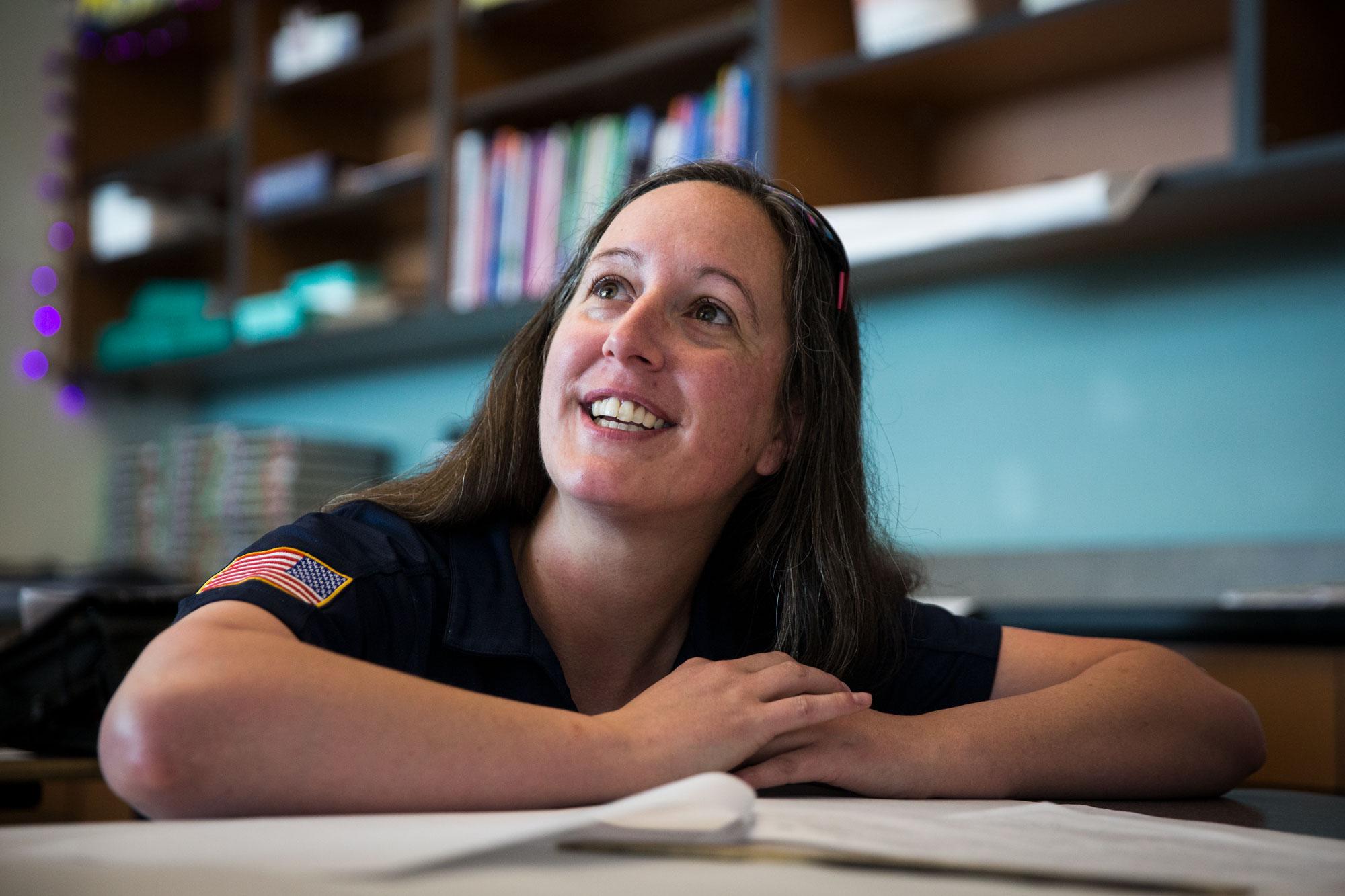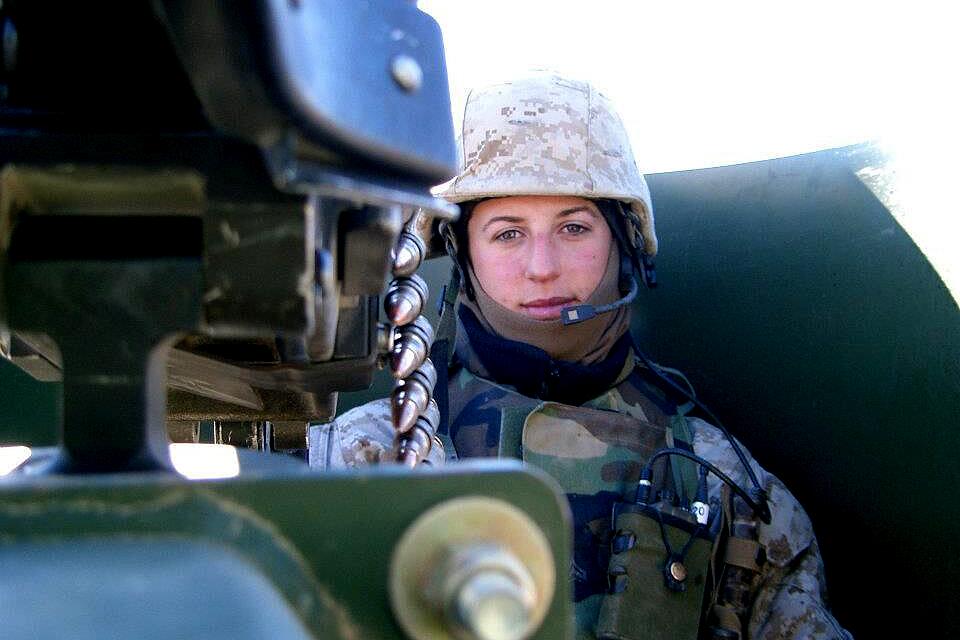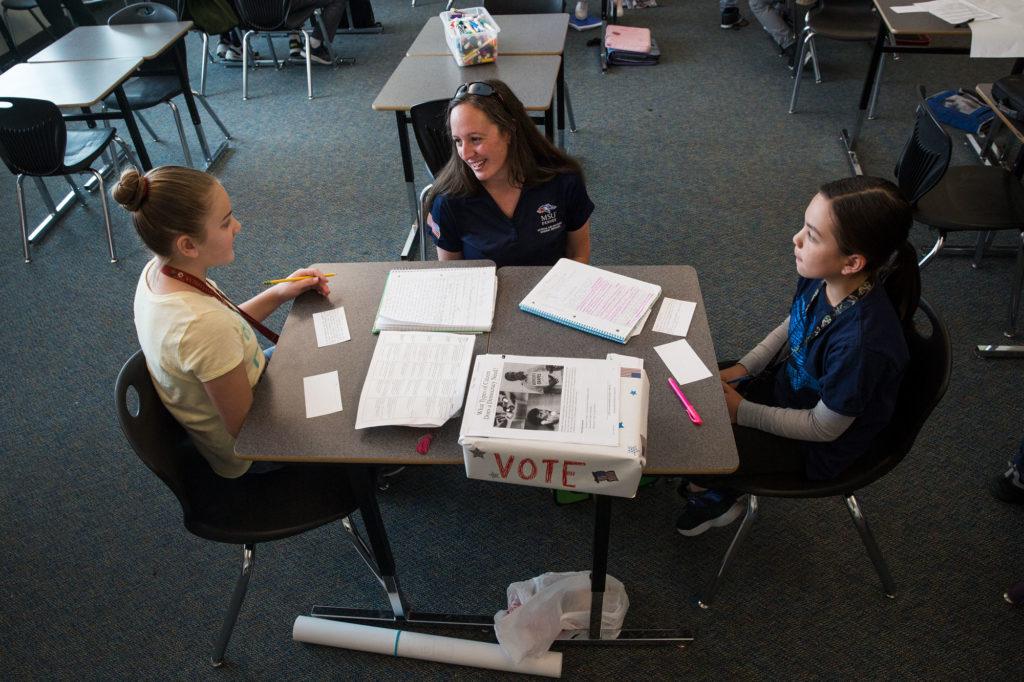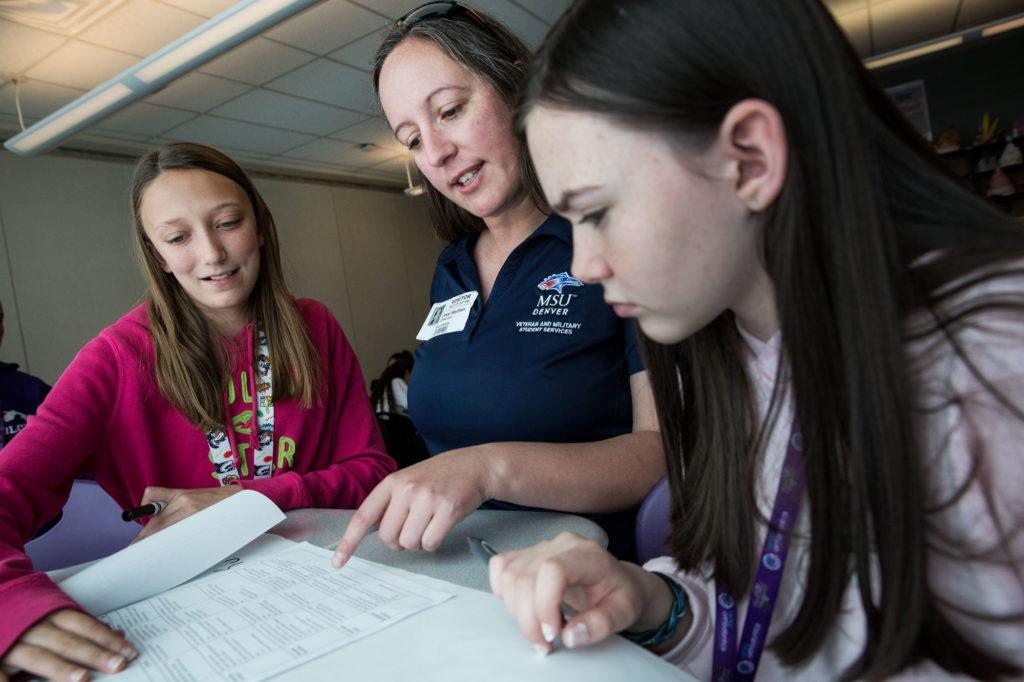
Jessi Warthen has packed a lot into her 34 years.
She’s been homeless, worked at a finance company and as a security guard, drilled pipe and hauled pea gravel.
She’s also a Marine who served three tours of duty in Iraq.
But in all of that, there was nothing more difficult than facing down a classroom of 30 middle schoolers, hashing out a lesson on power and collaboration. Warthen is now training to be a high school social studies teacher. She described watching one rowdy group of students, who ignored the rules of the exercise.
“It was like Lord of the Flies,” she said, laughing. “It was chaos, there was no order.”
Still, where she is now represents a victory. Warthen, with her warm personality and quick laugh, had to clear many hurdles, from discrimination to poverty, to get to the classroom. Like many veterans, she struggled to adjust to life after the military. Finding her way through it all will help her students one day, she said.
She wants to show them the range of possibilities that awaits them as they “get out and go into life.”
When Werthen was 18, teaching didn’t seem like an option. She struggled in school; today, she thinks she may have suffered from dyslexia or a learning disability.
“I had no option of going to college, no money,” she said. “I came from a very poor background. I thought well, my dad was in the Navy, my grandfather was in the Navy, my other grandfather was in the Army. I'm going to go join.”
Warthen chose the Marines. She was a runner and was looking for something more physical than intellectual. She did boot camp, Marine combat training, and then chose motor transport school. After more training in Japan and Korea, they asked for volunteers to go to Iraq.
“I was [the] first one raise my hand,” Warthen said.
She drove heavy trucks that carried up to 30,000 pounds of ammunition and fuel, bullets, Band-Aids and sometimes even bulldozers and tanks. When Warthen hauled fuel, it was like being a “walking bomb,” she said.
She had to fight for respect as a woman. When she was told she couldn’t be a machine gunner – handling the weapon on top of the truck – because she was female, Warthen spent weeks putting together her case, went to her superiors and won. The guys in her unit celebrated along with her.
“They were excited because I fought for something and I got the opportunity to show them that I could do it.”

But sometimes, she didn’t win. In November 2004, Warthen hauled supplies for a raid on Fallujah. It would prove to be the bloodiest battle in the protracted war, just a year after the kidnapping of Army soldier Jessica Lynch. Warthen said there was heavy intelligence the Iraqi insurgents wanted to kidnap another woman. Even so, after a long day’s work trucking concrete barriers and sandbags to the front lines, a lieutenant from another unit told the 20-year-old Marine she’d have to sleep outside the city’s protective wire because he feared a woman would sleep with his Marines.
“It was a nightmare,” Warthen said. “We helped them build up their posts so they can be safe. And then I was told I had to sleep on the outside.”
She walked toward her truck, thinking ‘I can’t believe this is happening. Literally, we have intel on that they’re trying to abduct women.’”
The cab and back of Warthen’s truck were full, so she’d have to sleep on the ground. As she prepared to get under her truck for protection, the two other drivers from her unit, both men, approached her. It was a freezing desert night but they joined her, sleeping beneath the truck as well. “Our rifles were out the whole time,” she said. “They put their lives at risk just to make sure that I stayed safe.”
Still, it was coming home that was the hardest.
The Marines have their own dark humor, their own language that civilians don’t understand, and she had fewer people to share it with. Sometimes Warthen still struggles for the right word. When discussing her training, she cast around for the right word before landing on “once I get embedded in a high school.”
A former Marine’s tendency to take charge can also be misinterpreted. In the Marines, when they’re told to do a job, Warthen said they just do it. If they see someone walking around not doing the job, they might say, “Just give it to me, I’ll do it.”
In a civilian workplace, that can offend people.
“It’s not like we’re being mean, but we’re very straightforward,” she said. “We’re very strict.”
After she left the Marines, Warthen paid $9,000 for a license to operate big equipment like front end loaders, backhoes and excavators. It was a big investment, and she was surprised for the reaction when she applied for work on one of her first construction sites.
“The guy basically told me, ‘no.’ He goes, ‘I only hire men,’” she said. She got similar responses at other sites. “I was like, wait a second, why can’t a woman do this?”

At one construction company, a foreman threatened to quit because he refused to work with a woman. Her supervisor hired her and made the two of them work together and Warthen later won his respect.
“Then after that, he defended me for months,” she said. “He'd be like, don't you say that just because she's a woman. It was actually kind of amazing.”
Eventually, her arm gave out due to a shoulder injury from Iraq and she had to leave construction. She began working as a security guard in Fort Collins. Her boss stopped her one night, she said, and propositioned her.
When she rejected him, she said, “he took me off the schedule ... completely.”
She still had to make rent and only had had $120 for the month. Quickly, she found herself homeless, as many veterans do. Her best friend, a fellow female Marine veteran, also experienced homelessness. Across the country, the Veterans’ Administration estimates there are between 20,000 and 40,000 homeless female veterans.
Warthen ended up living for months at a campground with her dog. It proved to be a turning point for her.
“It was actually kind of enlightening,” she said. “I thought it would be kind of bad, but I ended up having a really good experience because I met people who took care of me because I didn't have enough money for food.”
She began to realize it’s OK to ask for help. That’s especially hard for female veterans, she said. There are an estimated 45,000 female veterans in Colorado with few counselors for them.
One day she was talking with her brother about history, a subject she’s passionate about, and she had an epiphany: “I just want to be a history major and I want to go and teach history.” She bubbles over with enthusiasm as she talks about Hypatia, the Hellenistic Neoplatonist philosopher and cyclonic mathematician or about the turbulent history of Palestine.
Warthen enrolled in Metro State University where she just wrapped up her junior year majoring in history with plans to teach high school social studies. She’s also president of the Student Veterans at MSU Denver club and works to help vets in the university’s Veteran and Military Services center.
Her joy now is getting to see what she’s learned in a classroom, in her student teaching at Stuart Middle School in Commerce City. As the school year drew to an end, she helped oversee a class on governance. Students chose the types of citizens and type of government to populate their imaginary lunar settlement.

“What kind of government did you choose?” Warthen asked a student.
“Democracy,” he replied. She gently pushed him to explain why he chose that model.
After so many turbulent years, Warthen seemed at ease.
Teaching may prove more taxing than driving a 30,000 pound truck in Iraq she said. Thirty kids in a class, and then a different 30 later in the day, and again and so on and so on.
She shadowed teacher Jeanette Woodland, who said new teachers need a lot of grit and determination, as well as a passion for students’ wellbeing. “They need us to be so many other things,” Woodland said.
Warthen has had to find her own way of teaching. What worked for the teacher in one class wouldn’t work with another. There’s a lot more flexibility required in teaching than what she experienced in the Marine Corps.
Her experience in the military has served her well in other ways, though. Warthen thinks back to her time as a sergeant, when she often had to give what is called “hip-pocket” spontaneous classes on things like truck maintenance or public speaking. Although she acknowledges it’s made her a bit stricter than other teachers.
“If they can learn even just a minimal amount of discipline through schoolwork and through learning how to analyze history, logically thinking about it, debating…I’m going to teach them all kinds of stuff and I want to make sure it's not just a dry lecture,” she said.
Ultimately, Warthen doesn’t see a big gap between teaching Marines and high school kids.
“Eighteen- or 19-year-old Marines, they’re no different than (high schoolers) are,” she said. “They just have more cuss words, honestly.”
When she graduates, she hopes to teach in a school in rural Colorado.









